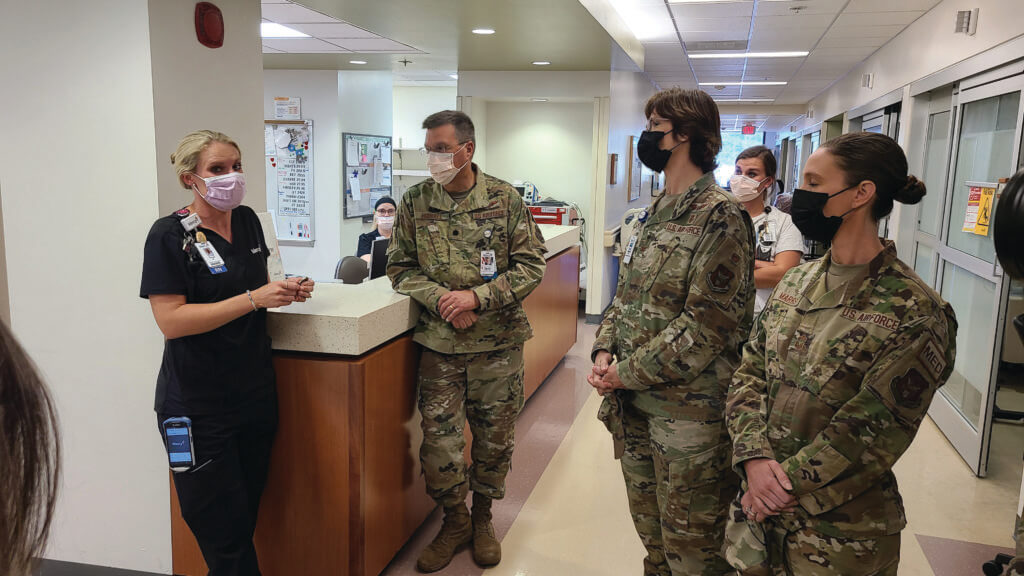Base realignment and Air Force Medical Service restructuring after the first Gulf War — in which some installations closed their hospitals and shifted to providing only primary care — was intended to save money by reducing excess infrastructure. But it had an unintended consequence.
Airmen in medical roles, especially those in the reserve components, lost chances to get hands-on training.
“What we realized during the second Gulf War was some of our clinical skills were a little dull because we didn’t have the opportunities they once had,” said Lt. Col. Ed Hubbell, 932nd Aeromedical Staging Squadron officer-in-charge of consolidated training.
A training affiliation agreement between Air Force Reserve Command and Mercy signed last summer is intended to change that. Under the agreement, all Air Force reservists in medical fields will be allowed to train at any of the St. Louis-based Catholic hospital system.
It builds on an existing agreement that originated with the Center for Sustainment of Trauma and Readiness Skills, or C-STARS, said Hubbell, who is also Mercy’s vice president of technology services. Most of that training happened at Saint Louis University hospitals, but trainees rotated through Mercy’s burn unit, Hubbell said.
The 932nd’s sister units in Youngstown, Ohio, and at Peterson Space Force Base needed pre-deployment training. They also needed to provide seasonal training, in which airmen upgrade their skills. Hubbell reached out to his Mercy colleagues and they agreed to support expanded training throughout the ministry’s 12 hospitals.
The program offers a little something to several groups. The biggest beneficiaries are the reservists who get the hands-on training they need to keep necessary certifications current.
Many reservists don’t have civilian jobs in medicine, Hubbell said, and might not have time during their annual tour to get that training. In addition to med techs and nurses, Mercy can host reservists in radiology, biochemical warfare, health care technology maintenance — almost any specialty but optical, Hubbell said.
RELATED: Central America militaries grow stronger through Guard relationships
Airmen being able to stay close to home has financial advantages, too. Hubbell gave the example of reservists in Troy, Missouri, who attended three to five level medical technician upgrade training at Mercy Lincoln.
“They just stayed at home and drove to the hospital every day,” Hubbell said. “That saves thousands of dollars for the military because you’re not putting them up in a hotel.”
Mercy’s employees not only have an extra set of hands and eyes to handle tasks like starting IVs, suturing wounds and administering EKGs, but sometimes the reservists are already familiar with new-to-the-hospital equipment. Battlefields have long inspired medical innovation.
“We share that information and knowledge with our Mercy coworkers that we have on the battlefield or new oncoming techniques and equipment,” Hubbell said.
He spent more than a decade as a nurse in both the Air Force Reserve and at Mercy, and was part of a military pilot of a handheld retroscope; another airman told their team about a tourniquet they had used.
“It’s very good for our patients,” said Betty Jo Rocchio, Mercy’s chief nursing officer. “Our patients benefit a ton from having the expertise on both sides working together to improve patient outcomes.”
She said the experience would make many of the reservists primary candidates if they wanted to join Mercy full time.
“Those familiar with our teams, they know some of our protocols and possibilities,” Rocchio said. “We would be glad to have them.”
Seeing reservists in the hospitals gives community members a chance to learn about and appreciate the dual mission of reserve component airmen who are supporting and defending them.
“When things hit the fan, we’re the first to go – it truly is a citizen force now,” Hubbell said.
The feedback from patients and Mercy employees has also been positive.
“I think it’s great for them to see the community supporting the military,” he said. “It’s been a win-win.”

